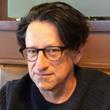For conductor-composer David Newman, when it comes to film scores, no one is more significant than legendary composer John Williams and his music for the “Star Wars.” films.
Alan Weissman
When watching Darth Vader prime the second Death Star to vanquish the Rebel Alliance in “Star Wars: Return of the Jedi,” it’s mostly a game of image first, film score second.
But what if it was the other way around? What if the music was front and center, to be experienced viscerally? And the visual less so?
Conductor-composer David Newman relishes the idea of bringing film music to the fore when he conducts the Chicago Symphony Orchestra in “Star Wars: The Force Awakens” in Concert from June 29 to July 1.
Newman has made a career conducting and composing film scores. He has performed film scores with many of the world great orchestras. For Newman, when it comes to film scores, no one plays out more significantly than legendary composer John Williams and his music for the “Star Wars” films.
It’s fitting, for Williams is not only Newman’s mentor, but also a Newman family friend. Newman hails from an uber-musical family with deep roots in the Hollywood musical landscape. He’s the son of Hollywood composer Alfred Newman, the older brother of film composer Thomas Newman and cousin of songwriter Randy Newman.
When David Newman was in his 20s, he cut his teeth doing studio work as a professional violinist and got to work on a lot of John Williams’ music, including the scores to “ET, The Extra-Terrestrial” (1982) and “1941” (1979). With the “Star Wars” scores, Newman works with music that is so well known, it feels like part of the nation’s musical DNA.
Newman feels that audiences attending such concerts is part of an evolution for film music, where the music is the star as much as the film. He argues that as a generation of classical music fans age out, a new generation is coming into the concert hall, with this generation more disposed to hearing film music on its own merits.
“Watching the film with the orchestra, you’re probably going hear the music a little bit more,” Newman said. “It’s kind of a weird, hybrid event that has a certain visceral excitement to it.” He likens the experience to listening to a Beethoven recording and then seeing it performed live and appreciating the nuanced differences in phrasing and rhythm.
“Watching a film with an orchestra, you’re probably going hear the music a little bit more. It’s kind of a weird, hybrid event that has a certain visceral excitement.” — David Newman
But as interpretations go, there is a short leash for any conductor. While there is room for interpretation and differing arrangements, it’s only to a point. With film music, there are synchronization issues and cues that must be honored to maintain the narrative thread. “It’s more like conducting a ballet score or an opera where you can’t just do anything, because if you go too slow, it is unsingable or undanceable,” he said.
For Newman, film music is mostly still rooted in 19th-century European traditions, even though the digital age has had a big impact on film scores. “The ‘Star Wars’ movies are very Wagnerian because there are so many themes,” Newman said. “It’s a very tightly controlled, thematic kind of formalistic way of doing music.”
Historically, Newman feels that film music has been often dismissed as a musical art form. “It was John Williams who really elevated film music with the Boston Pops. But it was an uphill thing,” Newman said.
In 1980, Williams succeeded the legendary Arthur Fiedler as the 19th conductor of the Boston Pops. For his initial performance, Williams programmed selections from what would become his score to “Star Wars: The Empire Strikes Back” (1983).
“Film music has really been looked down upon, without very much information or study,” said Newman. “Composers like Britten and others wrote about it in the ’30s and ’40s, and there were polemics against it.”
Newman said one reason the art form has not had much scrutiny is because materials are hard to get, and the difficulty of isolating the music when studying it because the visual narrative is the reason for its existence. “You watch a ‘Star Wars’ scene and take away the music, and it offers a completely different experience,” he said.
Often, film scores are often seen as ephemeral. “Film music has not been around long enough for people to understand what it is,” Newman said. “Generally, film music is a one-off. You write the music, parts are made, and after it’s done, the expectation is it will never get played again.”
But film music is being played again. Not only has it proven to be a robust and lucrative programming avenue for orchestras, it has become a classical music gateway for young audiences who are typically strangers to the concert hall.
“Audiences love it because they don’t know what to expect,” Newman said. “And it’s a lovely communal experience.”


